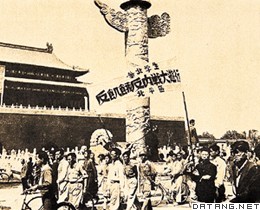1) anti-corruption in spirit


精神反腐
1.
By discussing the limitations of anti-corruption in system ,it is held that anti-corruption in spirit based on the construction of socialist spiritual civilization is an important means and addition to the resistance of corruption.
通过对制度反腐的局限探讨 ,提出了以社会主义精神文明建设为主体的精神反腐是反对腐败的重要手段和补
3) rebellious spirit


反抗精神
1.
Doris Lessing embodies the heroine s rebellious spirit in a peculiar way——silence in her short story A Woman on a Roof.
在她的短篇小说《屋顶丽人》中,她以独特的形式——沉默,来体现出女主人公的反抗精神。
2.
Hawthorne portrays a rebellious woman Hester in his successful novel The Scarlet Letter,condemns the unfair treatment of women,praises her pursuit of self-consciousness as well as her selflessness and rebellious spirit,which reveal the author s belief that women should be liberated.
美国浪漫主义小说家霍桑在其代表作《红字》中塑造了一位倍受侮辱而又充满反抗精神的坚强女性———海丝特。
3.
Here, we analyze three rebellious sisters, You Sanjie, Jane Eyre, Norah, to discover their striking rebellious spirit and brilliant characteristic charms.
分析这三个人物形象,揭示她们鲜明的反抗精神和夺目的性格魅力,会对我们进一步理解文学作品有很大的帮助。
4) spiritual rebellion


精神反叛
1.
CAO Yus contribution to C hinese drama and its significance lie in firstly his thinking system in ethic cr iticism and spiritual rebellion, secondly his prominent tragic aesthetics value, and thirdly the outstanding .
曹禺对中国话剧的建树及意义表现在 :首先 ,伦理批判与精神反叛的思想体系 ;其次 ,卓越的悲剧美学价值 ;第三 ,话剧文学样式的杰出发展。
5) retrospection spirit


反思精神
1.
This paper reviews it in the modernization course of Chinese literature since May-fourth Movement, shows that it returns and continues modern tradition of the new literature in three aspects of realism spirit, retrospection spirit and humanism spirit, evaluates the status, value and significance of Return Poetry in Chinese poetry development history of twentieth century.
归来诗歌是新时期文学的一个重要现象,本文将其置于五四以来中国文学的现代化进程中进行考察,通过对诗歌文本的分析,揭示其在现实主义精神、反思精神、人道主义精神三个层面上对新文学现代性传统的回归和接续,评估归来诗歌在20世纪中国诗歌发展史上的地位、价值和意义。
6) spiritual resist


精神反抗
补充资料:反饥饿、反内战、反迫害运动
| 反饥饿、反内战、反迫害运动 中国解放战争时期国民党统治区广大学生的民主爱国运动。1947年,国民党统治区爆发了空前严重的经济危机,广大人民反对国民党统治的斗争日益高涨。5月4日,上海学生上街进行反对内战的宣传,遭到国民党军警的镇压。各校学生在中国共产党的领导下立即罢课抗议并到市政府请愿。9日,近2万名电车、汽车及丝织工人罢工游行,要求增加工资。15日,南京中央大学等校3000余人,赴教育部进行反内战请愿。16日,北京大学院系联合会提出“反饥饿、反内战”的口号,北平各大学相继举行了罢课。学生运动的蓬勃发展,使国民党当局极为惊恐,于18日颁布《维持社会秩序临时办法》,严禁10人以上的请愿和一切罢工罢课游行示威。5月20日,京沪苏杭地区16个专科以上学校6000余名学生在南京举行挽救教育危机联合请愿游行,并向国民参政会请愿,遭到国民党宪兵、警察、特务的殴打,百余名学生被打伤,20多人被抓走。同日,平津学生也分别举行反饥饿、反内战的游行活动,天津学生在示威中遭毒打,50余名学生被军警殴伤,造成震惊全国的五二○血案。血案发生后,中国共产党提出反迫害的口号,把运动推向新的阶段。上海、南京、天津、北平等60多个城市的学生纷纷行动起来,举行罢课和上街游行示威。6月19日各地学生代表在上海集会,成立了中国学生联合会。学生运动与工人、农民、市民的斗争结合在一起,形成了反对蒋介石反动统治的第二条战线,有力地配合了人民解放军的作战。
|
说明:补充资料仅用于学习参考,请勿用于其它任何用途。
参考词条
